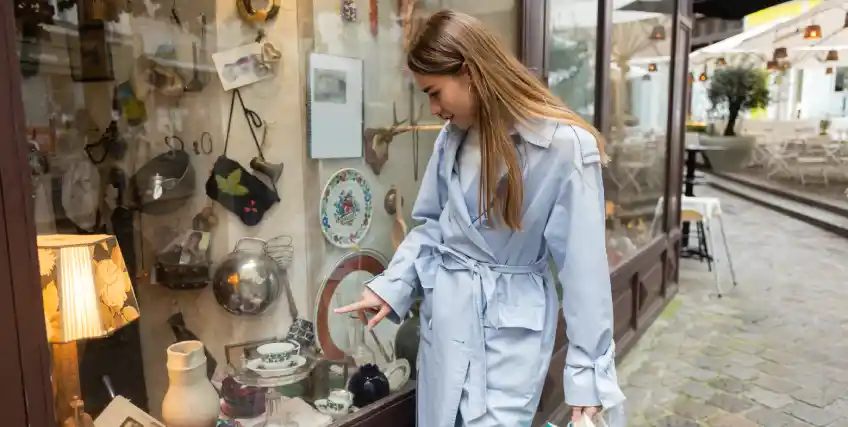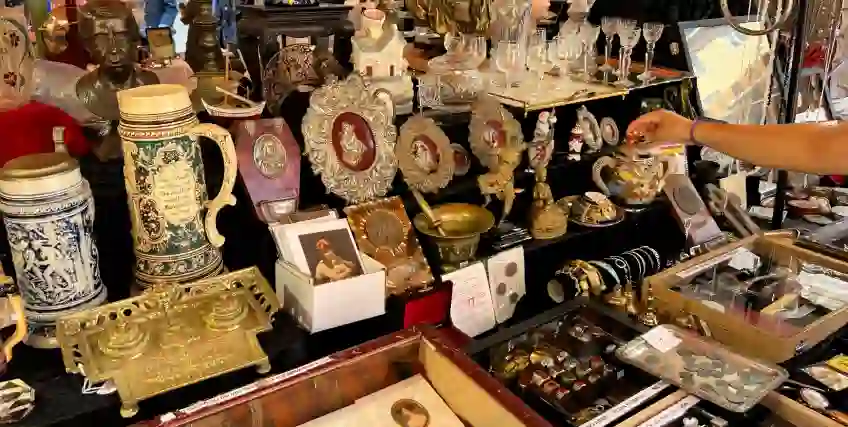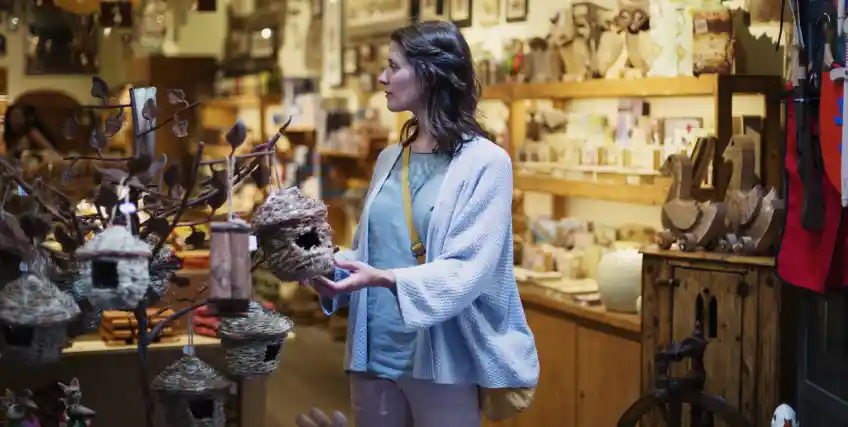Loans for Antique Stores:
Fast Funding for Your Next Rare Find
Looking for Business Financing?
Apply now for flexible business financing. Biz2Credit offers term loans, revenue-based financing, and commercial real estate loans to qualified businesses.
Set up a Biz2Credit account and apply for business financing
From unique estate pieces to century-old decor, antique shops do more than sell objects; they preserve stories. But even a well-curated collection isn’t enough to stay competitive in today’s retail space.
Whether you're setting up a second storefront or adding rare inventory, managing cash flow gets tricky. That’s where antique store business loans become essential. These loans provide the working capital needed to upgrade, expand, or survive slower seasons.
Most antique store business loans are used to modernize interiors, enhance marketing efforts, or stock high-ticket vintage goods. Some business owners also use the funds to create online stores or improve payment systems. With the right loan, a well-run antique shop can grow into a thriving retail business.
Where the Money Goes in an Antique Business
Every antique shop has unique expenses. But some costs are unavoidable. Here’s where antique store business loans can make a real difference.
1. Inventory from Estate Sales and Auctions
Rare finds don’t come cheap. Antique dealers often source collectibles from estate sales, private sellers, or online auctions. The purchase price, shipping, restoration, and insurance can quickly drain working capital. Many shop owners use antique store business loans to act fast when high-value items become available. Without quick financing, missed opportunities can affect both profit margins and customer retention. Sourcing is the backbone of a successful antique business and requires consistent cash flow.
2. Storefront Rent, Renovations, and Real Estate Costs
Location matters. Whether you’re leasing a boutique space or buying your own building, rent and real estate costs are major expenses. Renovating an older space to reflect vintage appeal adds to those costs. Antique store business loans help manage monthly rent, upfront deposits, or interior redesigns. A visually compelling storefront often improves foot traffic and customer experience. Having access to capital ensures your shop remains inviting, even as neighborhood rents climb.
3. Marketing and Social Media for Niche Buyers
Reaching the right audience takes smart marketing. Most antique stores benefit from digital ads, social media content, and even local sponsorships. But these tools come with a price tag. Business owners use antique store business loans to fund ad campaigns, influencer collaborations, and video promotions. A solid online presence brings foot traffic, builds credibility, and expands your reach beyond your ZIP code.
4. Insurance for High-Value Items
Insuring rare pieces is a must, especially if you deal in fine art, vintage jewelry, or imported furniture. General retail insurance doesn’t cover fragile or high-ticket collectibles. Specialty insurance costs more, but it’s necessary to protect your inventory. A small business loan can help cover premiums and ensure you stay compliant without straining your operating expenses.
5. Upgrades to POS Systems or eCommerce Add-ons
Antique shops need modern tech. Whether it’s upgrading your point-of-sale system or adding eCommerce functionality, costs can run high. Many stores now offer online checkouts, mobile payment support, or inventory syncing tools. Antique store business loans help fund these tech upgrades and improve customer experience. Even legacy businesses benefit from smoother checkouts and faster invoicing tools.
Financing Options for Antique Shops
Not every loan fits every business. For antique shop owners, choosing the right type of financing can make a big impact on growth and stability.
1. Short-Term or Long-Term Term Loans
Term loans are the go-to option for many store owners. If you're planning a major renovation, hiring staff, or investing in premium collectibles, a lump-sum loan with set repayment terms offers clarity. These antique store business loans come with fixed interest rates and monthly payments, which help with forecasting expenses. You can choose between short-term loans for urgent needs or longer terms for large-scale projects. Reliable repayment terms also boost your creditworthiness.
2. Line of Credit
A line of credit gives you flexible access to funds as needed. It’s ideal for buying inventory during estate sale seasons or when prepping for the holidays. Antique shops often experience seasonal fluctuations in foot traffic. Having this safety net means you’re covered during off-peak periods too. Unlike term loans, you only pay interest on what you use. That makes it a great tool for managing daily cash flow without overextending your financial health.
3. SBA Loans
If your store has been around for a few years with good credit and financials, SBA loans are worth exploring. They offer competitive interest rates, longer repayment windows, and higher loan amounts for qualified applicants. These antique store business loans are backed by the U.S. Small Business Administration, making them less risky for lenders. Approval takes longer, and paperwork is intense, but the terms often beat traditional loans. Strong financial projections and a solid business plan are must-haves.
4. Merchant Cash Advance
A merchant cash advance provides a lump sum based on your future sales. Repayments happen through daily or weekly card sales. It's fast and may not require collateral. It’s not ideal for large purchases, though, because repayment costs can be high. Still, if an estate seller offers a bulk deal on valuable inventory, this option helps you move quickly.
5. Equipment Financing
Display cases, custom lighting, and shelving add character to your store. But they’re expensive. With equipment financing, you borrow to purchase or lease these assets. The equipment itself often acts as collateral, reducing the need for a perfect credit history. Many business loans for antique stores cover both back-end tools and front-of-house upgrades. It’s a smart way to improve customer experience without dipping into your operating cash.
What Lenders Want in Your Loan Application
Before any money lands in your account, lenders will review specific criteria. Understanding the requirements for business loan approval puts you ahead of the game.
1. Time in Business and Business Plan
Most lenders prefer working with shops that have at least 1–2 years of experience. They want to see steady revenue, not just startup excitement. A well-structured business plan is essential. It should explain how you’ll use the funds, your marketing approach, and expected returns. For antique shop owners, including data on your inventory turnover and customer base can make your case stronger. Strong planning shows you're not guessing; you’re investing.
2. Annual Revenue and Cash Flow Patterns
Lenders want to see your store generate money consistently. This doesn’t mean record profits, but it does mean your cash flow can handle monthly payments. Most antique store business loans require a minimum annual revenue. Sharing monthly income reports, seasonal patterns, and key sales periods helps lenders assess risk. If your shop earns more during holiday seasons or summer tourist months, show it clearly in your records.
3. Personal and Business Credit Score
Your credit score says a lot about how you manage debt. Both personal and business credit histories matter in small business lending. A higher score unlocks better interest rates, but even mid-range scores can qualify for certain loans. Antique store owners with less-than-perfect credit often apply for merchant cash advance or short-term loans. But improving your score opens more doors, including SBA loans or long-term financing.
4. Financial Statements and Projections
Your current and projected financials give lenders a snapshot of your financial health. Expect to submit your profit and loss statement, balance sheet, and tax returns. Lenders use this data to gauge your loan eligibility. Clear financials show stability and planning. If you’re applying for larger antique store business loans, include future income projections, especially if you plan to expand, hire, or upgrade your storefront.
5. Licenses, Permits, and Tax Filings
You’ll need the right licenses to legally run an antique store, including resale permits or state business licenses. Some lenders check for these during the application process. Up-to-date tax filings are also a must. Late or missing taxes raise red flags. Meeting all legal obligations boosts your eligibility and assures lenders that your business is legitimate, compliant, and worth backing.
Benefits and Drawbacks of Antique Store Loans
Every loan has a flip side. Knowing the pros and cons of antique store business loans helps you make decisions that match your goals and financial situation.
Benefits of Antique Store Business Loans
1. Fast Access to Working Capital
Many funding business loans options offer quick approvals . This speed is crucial for antique dealers who need to grab inventory at estate sales or auctions. Fast funding helps you act before competitors do. Loans that provide same-week deposits support growth without pausing business. Whether it's restocking, repairs, or upgrades, having ready capital keeps operations smooth.
2. Helps Maintain and Grow Inventory
You can't run a successful antique shop without high-quality, desirable inventory. Antique store business loans allow you to stock up on valuable pieces when they appear, even if the timing isn't ideal financially. Regular inventory updates help you attract repeat customers and build a stronger brand presence. Buyers expect fresh stock, and having capital available ensures you're always ready to meet that demand.
3. Improves Customer Experience and Shop Ambience
Antique shops thrive on atmosphere. Clean displays, good lighting, and curated layouts enhance browsing. Loans can be used for renovations, custom shelving, or climate control systems for delicate items. These upgrades increase the amount of time customers spend in your shop and the likelihood they’ll make a purchase. The better the experience, the stronger your word-of-mouth marketing.
Drawbacks of Antique Store Business Loans
1. High Interest Rates on Short-Term Loans
Short-term loan products often come with steep interest rates. If you're not careful, repayment can cut deep into your profits. While fast funding is helpful, it's not always cost-effective. If your credit score is low, lenders may offer only high-rate products. It's essential to compare terms and assess your ability to repay before signing.
2. Strict Repayment Terms for New Shops
New antique store owners with limited history may face tight repayment terms. Lenders often ask for daily or weekly payments, especially on fast-cash products. This can strain your cash flow during slower sales periods. Without careful planning, the pressure to repay quickly may hurt your operations more than help them. Choose loan terms that match your seasonal revenue trends.
3. Collateral May Be Required by Lenders
Some lenders require you to back the loan with business or personal assets. If you can’t repay, you risk losing valuable inventory, equipment, or even your shop space. While antique store business loans can offer large amounts, securing them with property or high-value items might not be ideal for every business owner. Always read the fine print and understand the risks involved.
Smart Spending Strategies After Loan Approval
Getting approved is just step one. How you use your antique store business loans can determine whether your shop grows or stays stuck. Use funds where they matter most.
1. Buy Rare Collectibles That Attract High-End Clients
A well-timed bulk purchase can reshape your entire store layout. Whether it’s rare clocks, estate jewelry, or mid-century furniture, using business loans online approval to act quickly gives you an edge. Customers come for the rare and remarkable. When you spot a deal, you shouldn’t have to wait. Use capital to close that deal before someone else does. Big-ticket pieces also improve your average sale price and attract serious collectors.
2. Open a Second Store in a High-Footfall Area
A second location expands your reach. But upfront costs security deposits, lease fees, signage, and furniture, add up fast. Many antique store owners use antique store business loans to finance new stores in tourist-heavy areas or historic districts. A second outlet not only builds brand presence but also gives you access to a new customer base. With solid planning and the right financing for business, this move can double your revenue stream.
3. Start an Online Store or Upgrade Your Website
Ecommerce is no longer optional. Whether you’re listing on Shopify or Etsy, or building your own site, digital expansion needs funding. Use your antique store business loans for web design, product photography, SEO, or shipping integrations. With more customers shopping online, this investment keeps your store competitive. Many antique businesses now earn a good portion of sales digitally without needing to expand square footage.
4. Run Targeted Social Media Campaigns to Build Footfall
Social media isn’t just about followers.it drives sales. Paid ads, influencer collaborations, and branded content all require budgets. Your loan can help fund monthly ad campaigns that drive foot traffic and online sales. Niche hashtags and location targeting can bring local antique lovers straight to your door. A focused digital strategy backed by funding business loans boosts both visibility and sales in a short span.
Trusted by Thousands of Small Business Owners in America.**
Simply because we get what you go through to build a business you believe in.
**Disclaimer: All stories are real, as told by real business owners. Customers do not receive monetary compensation for telling their stories.
From One Entrepreneur to Another: We Get You
We understand what's behind building a business you believe in.
All stories are real, as told by real business owners. Customers do not receive monetary compensation for telling their stories.



Articles on Loans for Antique Stores
Loans on Antiques: A Comprehensive Look at Your Financing Options
Opening an antique store can be a promising business opportunity. The market for unique, high-quality collectibles attracts...
Antique Store Business Loans: Financing Options to Preserve and Grow Your Shop
Owning an antique store can be a lifelong dream for collectible-lovers. It’s an opportunity to be your own boss, while preserving history and serving...
Antique Stores Financing: The Ultimate Guide to Funding Your Shop
Antique stores often face unique financial hurdles. Sales can be unpredictable, inventory is hard to value, and banks may be reluctant...
Frequently Asked Questions About Loans for Antique Stores
1. What are antique store business loans used for?
Antique store business loans help cover inventory costs, rent, renovations, marketing, and even digital upgrades. They give shop owners the cash flow needed to grow, restock, or survive slower seasons.
2. Can I get business loans online approval for my antique shop?
Many lenders now offer business loans online approval, making it faster and easier to apply. You’ll still need to meet certain requirements for business loan eligibility, like credit score and revenue proof.
3. Is it possible to get financing for business expansion?
If you're opening a new store or building an online presence, financing for business needs like upgrades, equipment, or marketing can be covered through a loan.
4. Are antique store business loans available for startups?
It’s tougher for startups but not impossible. If you have a solid business plan, some lenders may offer small business loans or a merchant cash advance, even without years of operational history.
5. What are the basic requirements for business loan approval?
Most lenders will look at your credit history, business age, annual revenue, and financial statements. Some may ask for your business plan and licensing documents as well.
Frequent searches leading to this page
Term Loans are made by Itria Ventures LLC or Cross River Bank, Member FDIC. This is not a deposit product. California residents: Itria Ventures LLC is licensed by the Department of Financial Protection and Innovation. Loans are made or arranged pursuant to California Financing Law License # 60DBO-35839



